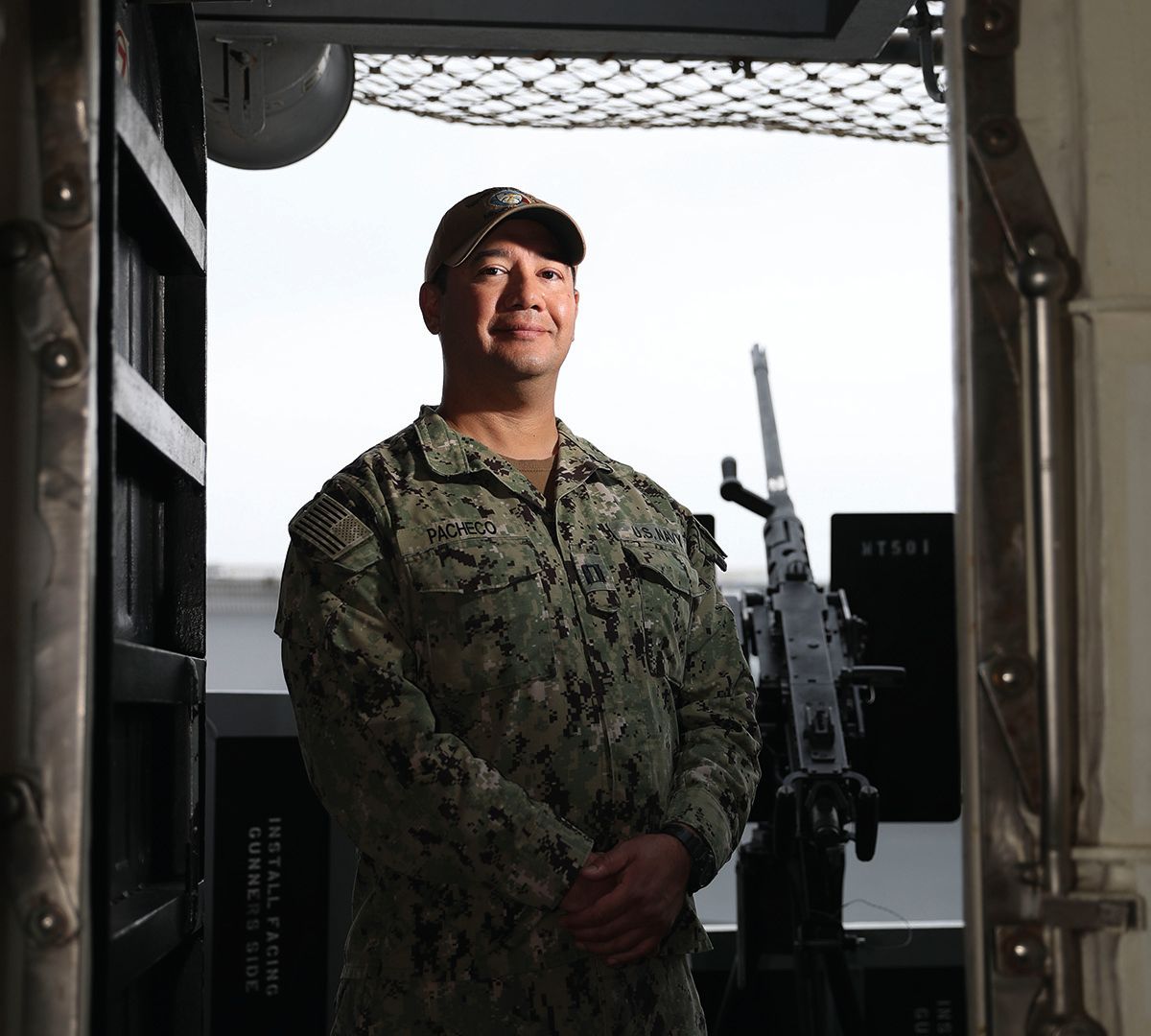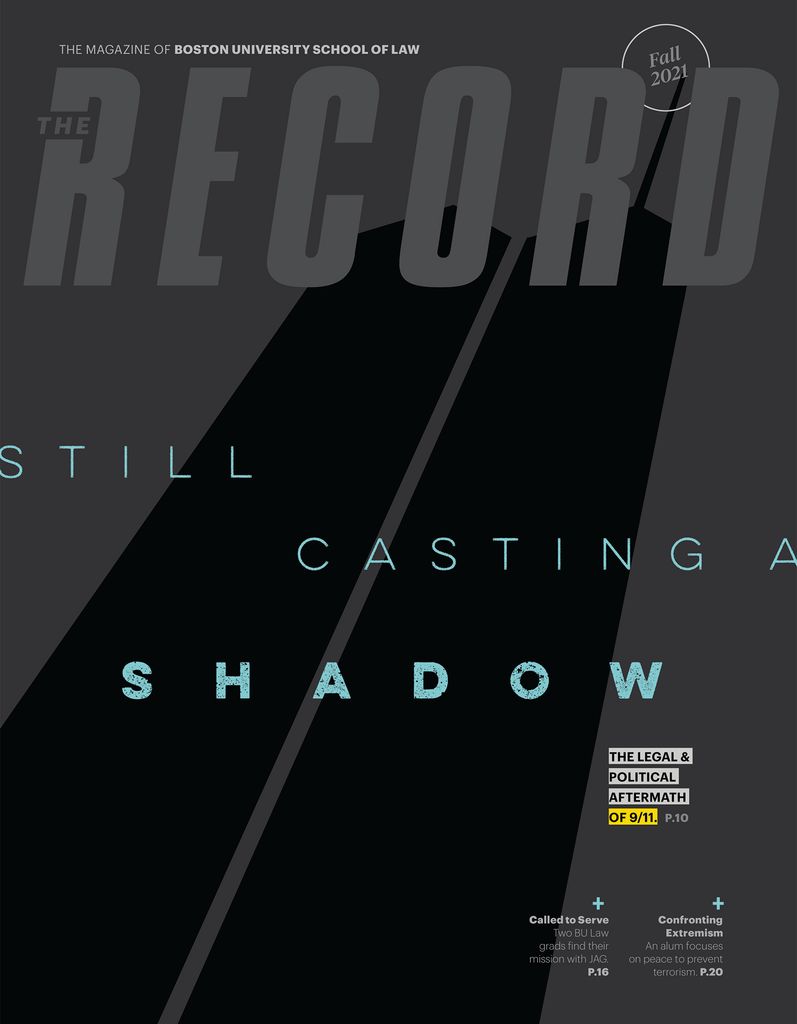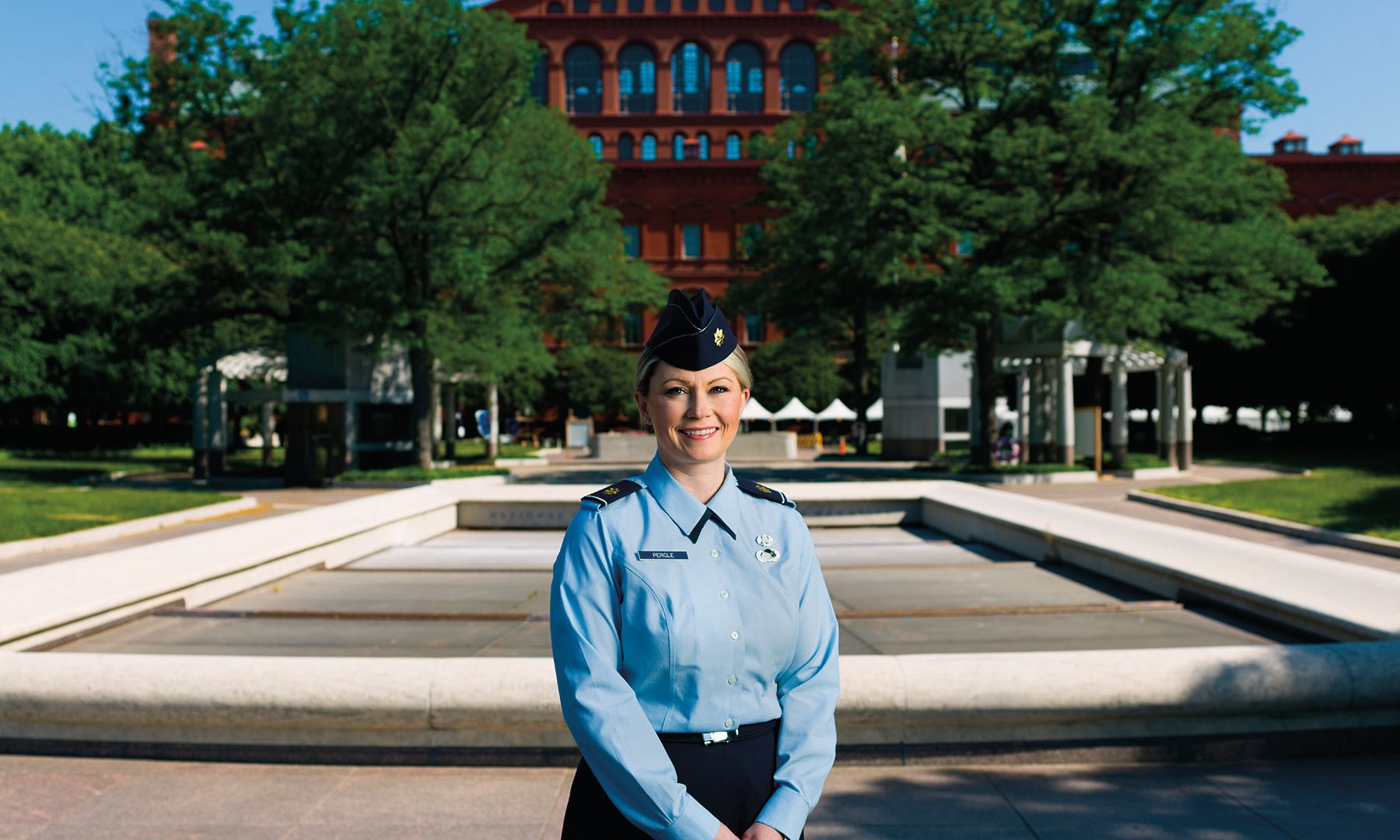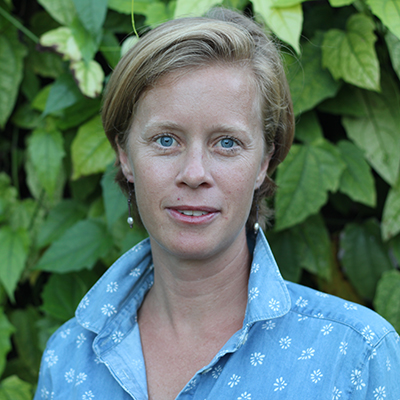Called to Serve
Two BU Law graduates found their mission in the military's Judge Advocate General's Corps, advising servicemembers and commandeers on issues ranging from combat operations to end-of-life planning.

Photo by James Wainscoat via Unsplash
Called to Serve
Two BU Law graduates found their mission in the military’s Judge Advocate General’s Corps, advising servicemembers and commandeers on issues ranging from combat operations to end-of-life planning.
When Dayle Percle (’11) first came to Boston University School of Law to begin her legal studies, she experienced a sort of culture shock.
The Michigan native had spent the past six years of her life in the military—first at the US Air Force Academy and then as a squadron section commander at a base in Italy.
The more casual atmosphere on BU’s campus was “a big adjustment,” she laughs, remembering thinking: “‘What do you mean people wear pajamas to school?’”
“People called their professors by their first names. I would stand outside professors’ doors to speak with them [until invited in],” she says.
Nevertheless, Percle didn’t have any trouble finding her place. She already knew she would return to the Air Force as part of the Judge Advocate General’s (JAG) Corps after graduation, so she chose her classes accordingly, including offerings on criminal law, trusts and estates, and federal courts.
“I tried to tailor my curriculum to what I expected life as a JAG to be,” she explains.
According to Percle and fellow BU Law graduate Sebastián Pacheco (’13), a JAG in the US Navy, that path offers the opportunity for a diverse and rewarding legal practice ranging from advising servicemembers on their wills and individual client representation in the courtroom to counseling commanders on operations during combat or humanitarian disasters. Among other assignments, Percle spent several months presenting evidence in prisoner-of-war detention hearings in Afghanistan. Pacheco investigated a January 2016 incident in which 10 US naval personnel were detained by the Iranian military in the Persian Gulf.
“I would never make a different choice,” says Pacheco, who is currently serving as part of a PHIBRON, the navy’s shorthand for an amphibious squadron. “Being part of the national defense mission—I feel like it’s a higher calling.”
When you’re working with people who are trying to do good with integrity, that’s a very motivating environment to be in.
Photo by Jimell Greene
Like Percle, Pacheco began his career at a military academy. After attending the Naval Academy Preparatory School, he spent two years at the US Naval Academy before detouring to pursue another passion—music.
“At the two-year point at the academy, they ask you to make a choice to sign a contract and get a commission,” he remembers. “I was 20 years old and in love with classical guitar.”
Pacheco, who grew up in Colorado and Arizona, voluntarily resigned and enrolled at the University of Denver Lamont School of Music, where he majored in classical guitar performance and minored in Japanese. After graduating, he taught English for three years in Japan as part of the Japanese consulate’s Japan Exchange and Teaching Program. When the 2008 presidential election piqued his interest in the law and the political process, he returned to the United States to attend BU Law.
Unlike Percle, Pacheco didn’t know he would be returning to the military after law school. He spent time in the Legislative Policy & Drafting Clinic, served on the staff of the American Journal of Law & Medicine, and spent a year in the Criminal Law Clinical Program (Percle did too—they both won their first trials as prosecutors).
“I tried to experience as much as I could,” Pacheco says.
After graduation, he accepted a clerkship with Massachusetts Appeals Court Associate Justice Diana Maldonado. Then, he worked at the Bristol County District Attorney’s Office as an appellate prosecutor before rejoining the navy as a JAG at the age of 39. Pacheco had assumed he was too old to rejoin until navy recruiters came to BU Law during his time there. “I figured it was a young person’s game,” he laughs. Hearing he was still eligible was “amazing,” he recalls. Serving in the navy had been a goal of his since he was a child listening to his grandfather’s stories about his service during World War II. He achieved that goal early on, left the service to follow another interest, and was grateful to get the chance to return.
“Coming back was very organic,” he says. “It had always been a dream of mine.”
Pacheco has had a series of assignments since commissioning in 2015, including serving as defense counsel for sailors facing administrative proceedings and investigating the Iranian incident with Navy Expeditionary Combat Command. He also served at Naval Medical Center San Diego where the courses he took on health law at BU came in handy; part of his role there was to provide legal advice to Institutional Review Boards (IRBs) for medical studies, including biometric analysis of sailors on ships during the COVID-19 pandemic.
In his current role, Pacheco is assigned to a PHIBRON preparing for deployment. The position is the first in which he’s been called upon to offer advice on the law of the sea and the law of armed conflict. He also has to be up to speed on international rules and laws governing humanitarian assistance.
“That’s the most exciting part of this job for me,” he says.
Even the preparatory missions—known as going “underway”—are challenging. Pacheco recalls one night when a sailor spotted what he thought was a fire on the horizon. It turned out to be nothing, but, because ships have a duty to rescue, Pacheco was gearing up to advise on the legal aspects of such a maneuver.
“The pace is challenging when you’re at sea,” he says. “Things can come up at any time.”

“I would never make a different choice. Being part of the national defense mission—I feel like it’s a higher calling.”
— Sebastián Pacheco (’13)
Photo by Melvin Fatimehin
Percle, who recently became a military judge after serving as air force appellate counsel for three years, has also cycled through a variety of roles as a JAG in the air force. After BU Law, she worked briefly on a base outside Seattle prosecuting cases and counseling base leaders on how to account for the presence of an endangered bird, among other issues. In 2012, she deployed to Afghanistan, where she spent six months working in detention operations with members of other branches of the military.
“It was a very interesting environment to be in,” she says. “It was very isolated—just the prison, the military police, the Afghan police, a whole bunch of lawyers, and the detainees.”
When she returned, she worked again as a prosecutor before being competitively selected for a defense assignment.
“It’s kind of the equivalent of hanging a shingle,” she says. “You’re no longer part of the base community. Your boss is your client, and you report to another senior defense counsel. You need that autonomy.”
Percle, who has also worked in a joint defense assignment in Norfolk advising a military planning unit, says she’s thankful for her experience on the defense side.
“It was such a rewarding job,” she says. “I grew so much as a person and an officer and a lawyer in seeing the good in everyone, no matter what they were alleged to have done.”
As trial and appellate counsel, Percle handled a range of cases, including sexual assault, an area that has received intense focus from congressional leaders in recent years. When she first arrived at Joint Base Andrews for her appellate position, the office was preparing a case for the US Solicitor General’s office to argue at the US Supreme Court. The office prevailed when the high court ruled 8-0 in US v. Briggs that there is no statute of limitations for rape cases under the Uniform Code of Military Justice.
“We got the result we were looking for,” Percle says.
Serving as a lawyer in the military means making sacrifices. Both Percle and Pacheco have lived apart from their spouses and families over the years. But the work is worth it, they say.
“It’s highly rewarding,” Pacheco says.
Percle, whose service commitment expired for the first time earlier this year, says she knew from the moment she arrived at the Air Force Academy that she had made the right career choice.
“I love what I do,” she says. “When you’re working with people who are trying to do good with integrity, that’s a very motivating environment to be in.”
Editor’s note: Both Percle and Pacheco spoke in their individual capacities and not as representatives of any branch of the military or the Department of Defense.


